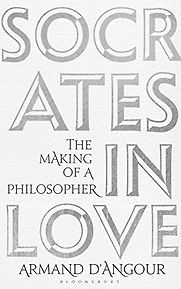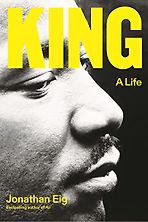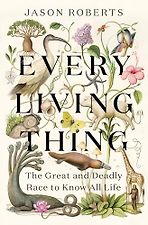Socrates in Love: The Making of a Philosopher
by Armand D'Angour
***🏆 A Five Books Book of the Year ***
Socrates was the 5th century philosopher who wandered about Athens barefoot, asking awkward questions, asking for definitions of such things as bravery, knowledge, and justice. He was ugly, with protruding eyes, a paunch, and a tendency to stop and stare into space. He was the philosopher who declared that the unexamined life is not worth living for a human being, and followed the inner voice that he heard. He was condemned to death for corrupting the youth of Athens and for following false gods. He was married to Xanthippe, who was much younger than him, and who was argumentative. But we only really know about this Socrates from two sources: the writings of Plato and of Xenophon. Of these two sources, Plato, who wrote dialogues in which Socrates appears as a character, is by far the most influential, yet we know that to some extent Plato was using the character Socrates as a vehicle for his own ideas. The Socrates I’ve described above was a middle aged man; but what was he like when a young man? How did he get to be the wisest man in Athens (at least according to the Delphic Oracle), whose wisdom lay in knowing how little he knew? Why did he turn away from the pre-Socratic philosophers’ concern with metaphysics and what we would now call science to focus on the question of how we should live?
These are the questions Armand D’Angour sets out to answer in Socrates in Love: the making of a philosopher (Bloomsbury, 2019). His account of Socrates’ early life is based on meticulous research into available sources, and on contextual knowledge that leads to plausible conclusions. The picture of the young Socrates that emerges is a fascinating one: he was from a reasonably well-to-do family, was highly educated, was adept at wrestling, dancing, and playing the lyre. For a number of years Socrates was a soldier, a hoplite, and distinguished himself for bravery in saving the life of Alcibiades. Socrates was bisexual, probably having an affair with his older philosophy teacher Archelaus, and married to a woman called Myrto before he married Xanthippe.
The story gets really interesting, and justifies the book’s title, when D’Angour puts forward the idea that one of the biggest influences on Socrates’ philosophical stance came from his encounter with a remarkable woman. In Plato’s dialogue the Symposium, which consists of a conversation about the nature of love, the character Socrates describes learning about the nature of love from Diotima, who set out the theory that we move from the love a particular attractive person, to love of beautiful people in general, to love of beauty and goodness itself in the abstract. This ladder of love leads from the very particular sexual attraction to love of the Platonic Form of the Good. D’Angour’s hypothesis is that Diotima was a real person, Aspasia, and that Plato has included coded clues to her identity within the dialogue. Aspasia was Pericles’ lover, but as she came from Miletus rather than Athens couldn’t marry him. She has even been credited with writing some of Pericles’ famous funeral oration.
Whether or not D’Angour is right about Aspasia, and he makes a good case, this is a fascinating book, that tells a plausible story, based on real evidence, about how the young Socrates became the man we know so well from Plato. D’Angour has a light touch, and, although this book is based on extensive scholarship, it is written for a general audience, and makes no assumptions about the reader’s familiarity with philosophy or with the ancient world. Highly recommended.
Recommendations from our site
“This is a book that’s impossible to write, in a way. It’s a biography of Socrates, who refused to write anything down, as a matter of principle. Socrates felt that the written word was a bad thing for philosophy (and life) because although it looked intelligent, every time you asked a question it always gave the same response, whoever asked the question. Whereas if you spoke to somebody, you could adjust what you said according to who was in front of you…Armand D’Angour has attempted to write the story of Socrates’s life using his knowledge of Classics and ancient history. He has analysed the sources that exist: largely Plato’s writings—his famous dialogues—and also Xenophon’s Socratic dialogues, which are quite different in style and present a different, slightly more ploddy Socrates.” Read more...
The Best Philosophy Books of 2019
Nigel Warburton, Philosopher
“Whether you accept D’Angour’s theory that the young Socrates was very different from the older man portrayed by Plato – lover, warrior, wrestler, dancer – the elegance of D’Angour’s prose, and the lightness of his touch, make this a very pleasurable read.” Read more...
Philosophy Books to Take On Holiday
Nigel Warburton, Philosopher
Our most recommended books
-

King: A Life
by Jonathan Eig -

Candy Darling: Dreamer, Icon, Superstar
by Cynthia Carr -

Wild Thing: A Life of Paul Gauguin
by Sue Prideaux -

Augustus The Strong: A Study in Artistic Greatness and Political Fiasco
by Tim Blanning -

Every Living Thing: The Great and Deadly Race to Know All Life
by Jason Roberts -

Patriot: A Memoir
by Alexei Navalny, translated by Arch Tait with Stephen Dalziel








Five Books review